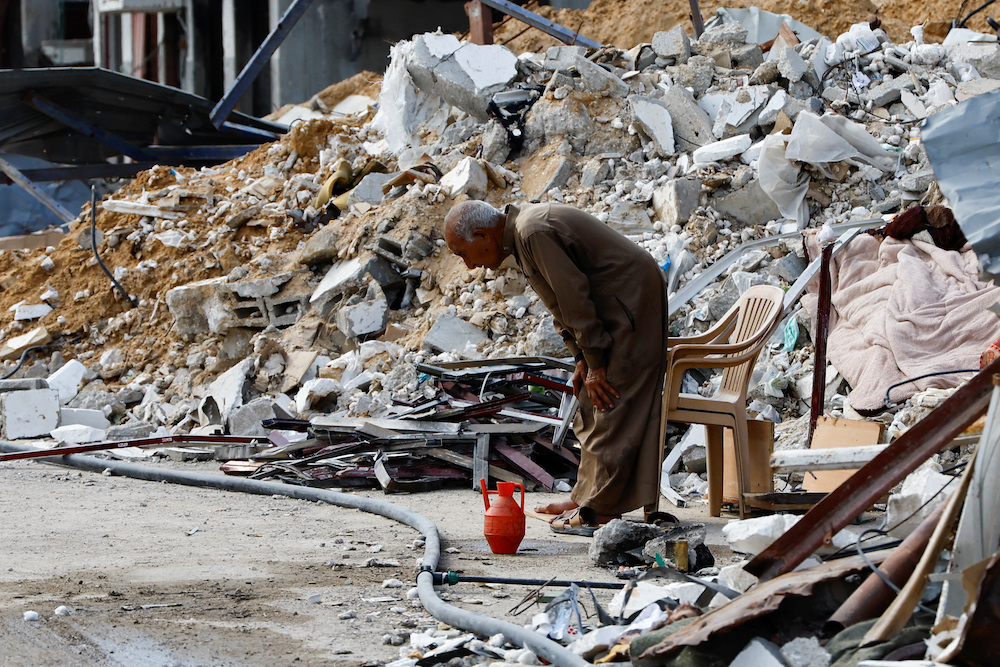Israel and Hezbollah each have strong incentives to heed international calls for a ceasefire that could avert all-out war — but that doesn’t mean they will.
Hezbollah is reeling after a sophisticated attack on personal devices killed and wounded hundreds of its members. Israeli airstrikes have killed two top commanders in Beirut in less than a week, and warplanes have pounded what Israel says are Hezbollah sites across large parts of Lebanon, killing over 600 people.
So far, Israel clearly has the upper hand militarily, which could make it less willing to compromise. But it’s unlikely to achieve its goal of halting Hezbollah rocket fire with air power alone, and a threatened ground invasion of Lebanon poses major risks.
After nearly a year of war, Israeli troops are still fighting Hamas in Gaza. And Hezbollah is a much more formidable force.
“Hezbollah has yet to employ 10 percent of its capabilities,” military affairs correspondent Yossi Yehoshua wrote in Yediot Ahronot, Israel’s largest daily newspaper. “The euphoria that is evident among the decision-makers and some of the public should be placed back in the attic: the situation is still complex and flammable.”
The United States and its allies, including Gulf Arab countries, have tried to offer a way out, proposing an immediate 21-day ceasefire to “provide space for diplomacy.”
But any deal would require both sides to back away from their core demands, and they may decide the price is too high.
Hezbollah wants a truce in Gaza, too
Hezbollah began launching rockets, drones and missiles into northern Israel after Hamas’ Oct. 7 attack in the south triggered the war in Gaza. Hezbollah and Hamas are both allies of Iran, and the Lebanese militant group says it is acting in solidarity with Palestinians.
Israel has responded with waves of airstrikes. Overall, the fighting has killed dozens of people in Israel, more than 1,500 in Lebanon and forced the evacuation of tens of thousands of people from communities on both sides of the border.
Hezbollah has said it will halt the attacks if there is a ceasefire in Gaza. But months of negotiations over Gaza led by the United States, Qatar and Egypt have repeatedly stalled, and Hamas might be less motivated to reach a deal if it thinks Hezbollah and Iran will join a wider war against Israel.
For Hezbollah, halting its rocket fire without securing any tangible gains for the Palestinians would be seen as a capitulation to Israeli pressure, with all of its recent casualties suffered in vain.
Any deal involving a ceasefire in Gaza would be a hard sell for Israel, which would view it as a reward for Hezbollah rocket attacks that have displaced tens of thousands of its citizens for nearly a year.
For Israel, a ceasefire might not be enough
Israel’s goals in Lebanon are far narrower than in Gaza, where Prime Minister Benjmain Netanyahu has vowed “total victory” over Hamas and the return of scores of hostages.
Israel wants the tens of thousands of people who were evacuated from northern communities nearly a year ago to return safely to their homes. And it wants to ensure that Hezbollah never carries out an Oct. 7-style attack.
A weekslong ceasefire — which would give Hezbollah a chance to reset after major attacks on its chain of command and communications — might not be enough.

Few Israelis are likely to return if they know it’s only temporary, and even an agreement for a lasting ceasefire would face skepticism.
The UN Security Council resolution that ended the 2006 war between Israel and Hezbollah called for the militants to withdraw north of the Litani River, some 30 kilometers (18 miles) from the border, and for the area between to be patrolled by Lebanese forces and UN peacekeepers.
Israel says that provision was never implemented and is likely to demand additional guarantees in any new ceasefire. But Hezbollah is far stronger than Lebanon’s regular armed forces and the UN detachment, neither of which would be able to impose any agreement by force.
Netanyahu’s partners want him to fight on
Netanyahu leads the most religious and nationalist government in Israel’s history. His far-right coalition partners have threatened to bring down his government if he makes too many concessions to Hamas, and they are also likely to oppose any deal with Hezbollah.
Bezalel Smotrich, Netanyahu’s hard-line finance minister, said Thursday that Israel’s campaign in the north “should only end in one scenario – crushing Hezbollah and denying its ability to harm residents of the north.”
Itamar Ben-Gvir, the far-right National Security Minister, said he would not support a temporary ceasefire and would leave the government if it becomes permanent.
Although opposition parties would likely support the ceasefire, the defection of his partners would eventually bring down Netanyahu’s government and force early elections, potentially leaving him even more exposed to investigations into the security failures of Oct. 7 and corruption charges that predate the war. It could even mean the end of his long political career.
Iran has sent mixed signals
In Lebanon, Prime Minister Najib Mikati has welcomed the ceasefire proposal, but he has little power to impose an agreement on Hezbollah.
Iran, which helped establish Hezbollah in the 1980s and is the source of its advanced weapons, has more sway over the group, but it has yet to express a position on any ceasefire. It likely fears a wider war that could bring it into direct conflict with the United States, but can’t stand by indefinitely while its most powerful proxy force is dismantled.
Iranian President Masoud Pezeshkian, a relative moderate elected over the summer, struck a more conciliatory tone toward the West than his predecessors when he addressed the UN General Assembly on Tuesday.
But he had sharp words for Israel and said its heavy bombardment of Lebanon in recent days “cannot go unanswered.”

































